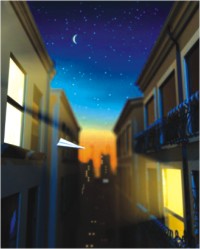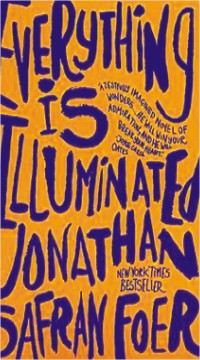
|
Home |
Issues | The Daily Star
Home
|
|
|
The guilt that had manifested itself through tears and mucous clung to me. The tears never rolled down the cheeks, blurring my vision by staying put instead. The mucous clasped itself with an unsightly presence. The guilt that had impassioned its silver pelts, to thaw a bitter cold winter numbed my fingers. Running them over my skin, I felt what I felt running it over the cool marble floor. Numbness spread till all I could hear was a ringing, perhaps a beating of some winged vengeful creature, come to do much deserved justice. I rose to my full height under the starry sky. It was much like the walk we took that night. I remember shooting stars. I had hoped your wish would come true. Until the point I betrayed it. I leaned close to the railing, looking down at the scurrying of blissfully unaware ants. The sky had a ghoulish violet light, but it wasn't a particularly quiet night. So there really would be none of nature's exhibitions to portend something great to happen. The stars glowed, not with as much light, as I would, had I been one of them, shining with beautiful regret. They would cry out for kings, but not for paupers. The chilly wind of the ill hour cut across my face long grown oblivious to it. I stood up on the railing and sniffed the dry winter's mist. I felt guilt pouring out, out of me in great torrential floods, to submerge life below, yet not nearly fast enough to leave me for good. Guilt took guilt's place. Guilt at not feeling guilty. Utter hopelessness. I felt it weigh me down making me slouch. I looked down again, hoping one drop of the accumulated tear would drop from my eyes. None did. A black hole ushered me down. The modern man's strife ushered me down. There was now, too much weight to bear. Without a thought I jumped. In this life, where only your opinion mattered once, I was beautiful enough to fly like angels. By Ahsan Sajid A place called home  I waited for the demolishers to appear. I stood there, in front of the house, not daring to tear my eyes off the building for a single second. The place I had spent the most precious years of my life in. It was seven storied, with huge old-fashioned windows and wooden doors. The paint was peeling off, there was absolutely nothing beautiful about the whole structure. Not a single thing. Yet…it was so precious to me… I waited for the demolishers to appear. I stood there, in front of the house, not daring to tear my eyes off the building for a single second. The place I had spent the most precious years of my life in. It was seven storied, with huge old-fashioned windows and wooden doors. The paint was peeling off, there was absolutely nothing beautiful about the whole structure. Not a single thing. Yet…it was so precious to me…
I let my mind drift several years back. I could see the same building, but it looked so different. There were potted plants out in front and birds seemed to be chirping from everywhere. Loud voices could be heard from the second floor. Yes, that is where I lived. It was a two bedroom flat, with one living room, one kitchen and one bathroom. Guess how many of us lived there. The answer is thirteen. Yes, you heard me right. It was amazing how all of us fit in there. Well half of us would sleep on the floor while the other half slept on the bed. But we used to take turns, so that there was no unfairness. Oh, it was one of the toughest times in my life. Back then, I used to think that I had a terrible childhood. However, the truth is, I would give anything to get that time back. I especially remember the mornings. My father, uncle and grandfather would have office while us children had school. There used to be a long line in front of the bathroom. Every time someone entered, the others would get impatient and take it all out on the door. We would have fights about who took the longest time and who got to go in first. Dinnertime was another story. There was never enough for everyone no matter how much was cooked. Such beasts we were! During the afternoons, we children would go out in front of the house and play. We tried to stay out as long as possible. Anything to keep away from the crammed place called “home”. While we had fun, at home, our mothers and grandmother would delightfully have tea, enjoying the peace and tranquility. However, things changed quite suddenly. My father got a job offer abroad and we had to go with him, leaving our cousins and grandparents behind. Years passed, the family grew and more money began coming in. Seven years later, we had to come back because my grandfather had suddenly fallen sick. My parents decided that money was not as important. I was shocked. In fact, I was happy. My uncle had bought an amazingly luxurious apartment, with tiles and a bathroom for each room! “Boom!” came the sound of the bulldozer. I snapped out of my reverie and watched with disbelief as the bricks came crumbling down. My eyes brimmed with unshed tears. I just stared at the whole scene helplessly as the people easily destroyed the building. True, I had not come back to visit my old home since I had gotten back. Three years had passed. I never came. I mean, why would I? But yesterday I got the call from the landlord and he broke the news to me. Actually, he wanted help. The government was destroying the building, claiming that it was illegal. And some help I had been! He was standing right beside me, looking as terrible as I felt. Soon even the last bricks were gone and a scene of complete wreckage was left. Feeling By Nayeema Reza Everything is illuminated  Back in school, my Literature teacher told us about the functions of humour, how it was able to criticise social circumstances, lighten up a heavy scene, and amuse the audience. Over the course of the years, I've seen these different functions in action: in slapstick comedy riddled with toilet humour, in witty satirical articles, and on stage. Apparently, studies show that a joke is always funnier to the teller than his audience. Never having had much luck in writing comedy, I've learned to appreciate the artistry of a successful comic author. Back in school, my Literature teacher told us about the functions of humour, how it was able to criticise social circumstances, lighten up a heavy scene, and amuse the audience. Over the course of the years, I've seen these different functions in action: in slapstick comedy riddled with toilet humour, in witty satirical articles, and on stage. Apparently, studies show that a joke is always funnier to the teller than his audience. Never having had much luck in writing comedy, I've learned to appreciate the artistry of a successful comic author.
It was when I read Everything is Illuminated, however, that my experience of humour bumped up to a whole new level. The novel is essentially about a Jewish author, Jonathan Safran Foer who travels to Ukraine in order to track down Augustine, the woman who saved his grandfather during the Holocaust. Armed with photographs of the woman and his grandfather, he turns up at Lvov to be greeted by his translator-cum-guide named Alex Perchov, who's learnt all his English from a thesaurus and never seen it in practical use. Accompanying them are Perchov's 'blind' grandfather and his demented seeing-eye-dog Sammy Davis Junior, Junior. The story is then told in two arcs; Foer's quasi-magical rendition of the history of Trachimbod, the fictionalised shtetl (town) of his grandfather's youth, and in broken and misapplied English, Perchov's accounts of the quest for Augustine. Starting off on a hilarious note, with liberal helpings of irony, the accounts show the gradual bonding between the two narrators as the story progresses. The humour acts as a cushioning for the more poignant moments, so that the reader is firmly in the compelling grip of the story before the horrors of the holocaust, or the numbing loneliness of the people of Trachimbod actually hit. Everything is Illuminated is a story that will shock you to silence, make you bust your guts out laughing, and move you to tears. It's been made into a movie starring Elijah Wood (where the author plays a minor role), but I've been told the book's much better, so go check it out! By Sabrina F Ahmad |
|
| home
| Issues | The Daily Star Home © 2008 The Daily Star | |